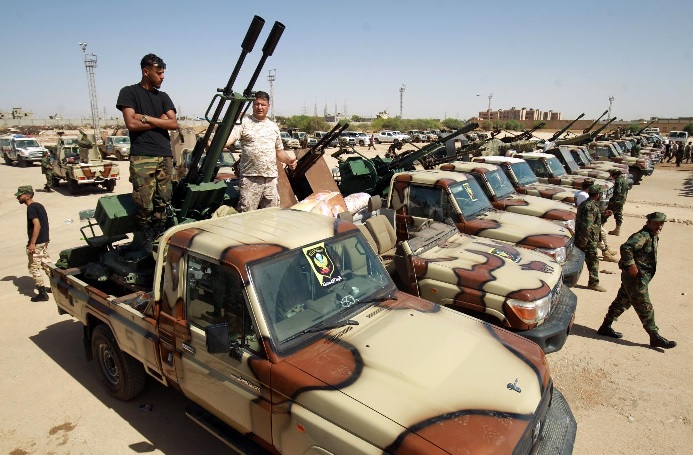
More than 300 flights arrived in Libya’s east from Syria over six months in breach of an arms embargo, UN report says.
Moscow flew hundreds of military flights into Libya in breach of an arms embargo, as it stepped up its logistical support for a shadowy Russian private military contractor accused of committing war crimes in the North African country, a UN report said.
The report by independent sanctions monitors – submitted to the UN Security Council Libya sanctions committee on Wednesday but not yet public – said Moscow flew 338 cargo flights from Syria in the nine months to 31 July to aid Wagner Group fighters backing eastern-based Libyan commander Khalifa Haftar.
The report, which was seen by Reuters, also found that Turkey, the United Arab Emirates, Jordan, Russia and Qatar breached an arms embargo on Libya.
It comes as Libya’s acting UN envoy said on Wednesday that the reckless arms build-up by both sides in the conflict “risks igniting large-scale confrontation” as coronavirus “spirals out of control” in the country.
The UN report assessed “that direct Russian Federation military logistic support to ChVK Wagner, and possibly the other Russian Federation based private military companies … significantly increased from January 2020 to June 2020”.
It listed some 338 “suspicious flights from Syria by Russian Federation military aircraft” to Libya between 1 November 2019 and 31 July 2020. In a confidential May report, the sanctions monitors said that Russia-based Wagner Group had up to 1,200 people deployed in Libya.
Russia’s UN envoy, Vassily Nebenzia, rejected any accusation of Russian interference.
“Not a single Russian serviceman is currently in Libya,” he said, while his US counterpart Kelly Craft slammed the presence of Russian mercenaries linked to the Kremlin.
“There is no place for foreign mercenaries or proxy forces in Libya, including the Russian Ministry of Defence proxy Wagner Group, which is fighting alongside” Haftar, she said
‘Ineffective’ embargo
Libya descended into chaos after the Nato-backed overthrow of leader Muammar Gaddafi in 2011. Since 2014, it has been split, with an internationally recognised government controlling the capital Tripoli and the northwest, while Haftar rules the east.
“The arms embargo remains totally ineffective,” the UN report said.
“Since the more direct engagement by Turkey in December 2019 and the United Arab Emirates in January 2020, arms transfers to Libya by those two member states have been extensive, blatant and with complete disregard to the sanctions measures,” it said.
The report also found that Egypt, Jordan, Russia, Syria, Qatar, Turkey and the UAE breached UN sanctions by not inspecting “cargo of suspicious commercial vessels or aircraft destined for Libya for which there were reasonable grounds”.
Meanwhile, the UN’s acting envoy to Libya Stephanie Williams said on Wednesday that the flow of arms in breach of the embargo was ongoing.
Speaking to the Security Council, Williams said that some 70 resupply flights landed in support of Haftar’s self-styled Libyan National Army (LNA) since 8 July, while in the same period 30 flights and nine cargo ships carried material to western Libya to support the rival Government of National Accord.
Williams warned that any reckless action “risks igniting large-scale confrontation, with the devastating consequences this would entail for the country and the region at large”.
Williams added that Libya’s healthcare system was “nearing collapse” as the number of confirmed cases of coronavirus cases doubled over the last two weeks to 15,156, a surge that owes much to the impact of the conflict and a blockade on oil exports by eastern forces on living conditions.
“Exponential increases are a worrying trend with community transmission now reported in some of Libya’s main cities,” Williams said, adding that the true scale of the pandemic in Libya was likely far higher than recorded numbers showed.
“Nearing full collapse after more than nine years of conflict, the health care system is unable to respond,” she said.
The UN missions of Egypt, Syria, Jordan, Russia, Qatar, Turkey and the UAE did not immediately respond to a request for comment on the accusations in the report.
Russian President Vladimir Putin said in January that if there are Russians in Libya, they are not representing or paid by his government.
